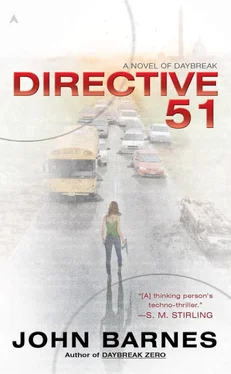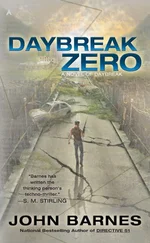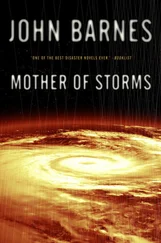“By agreement, you each get a secretary, no guards, and a side of the table in my office. You can rest and wait in an adjoining room with a bed, bath, and food till Mr. Nguyen-Peters arrives; we expect him this evening. I take it that the First Lady, here, is now your secretary?”
“You could be less sarcastic,” Allie said.
“I could. You should hear me with Cameron.”
Later that evening, Heather met the Black Express, the fast unmarked steam train that carried Cameron Nguyen-Peters to Pueblo.
She knew that both of them were men of honor; she had not worried at all about the possibility of being seized or kidnapped while meeting each of them.
The horse-drawn carriage, a replica stagecoach from some tourist spot, had been blacked out. When she, Cameron, and the quiet young man who was to be his secretary were seated, Cam said, “This is very nearly blackmail and certainly trading on our old friendship.”
“Graham Weisbrod said the same thing.”
They rode quietly for a while. Cam peeked around the blind. “How are things out here?”
“Not bad. Rail lines are up and running to Austin and Albuquerque, and even though there’s not much Denver left, the connection’s still there for east-west lines. Between that, the big post office, and the GPO, Pueblo will probably grow rich on trade.”
“I can see why you would want peace.”
“There’s something selfish about preferring to be free to build and prosper?”
Cameron made a face. He bent forward, clenching himself as if he were in a straitjacket. “You always had a knack for the awkward question.”
They said no more till at last the President and the Coordinator sat across the table from each other in Heather’s inner office.
Heather said, “I appreciate your coming today. I know I have traded on our past friendship, nearly blackmailed you—and of course I have ensured that by broadcasting a Rosetta-stone version of your codes, if you weren’t reading each other before, you are now. So now I have you both at a table you don’t care to be at. I’m just glad to see you here. And here’s your special guest.”
“Special—”
Chris Manckiewicz came in looking as if he were about to be hanged, except less comfortable.
Cameron leaped to his feet. “I didn’t think it was necessary to say ‘no press!’”
Graham rose almost as quickly, saying, “And neither did I—”
Chris looked sicker than both of them put together. “Heather has made me swear to absolute secrecy, and added that I can’t publish until she gives permission or until twenty years after both of you are dead.”
“Nonetheless—” Cameron was packing his briefcase.
“I am not here as press,” Chris said. “I may someday turn out to have been here as a historian, but that’s not the point.”
Weisbrod looked as if he’d been hit across the back with a bat. He glared at Heather. “It does seem to me, looking back, that this is far from the first time you’ve manipulated me, and that my friendship for a lost, angry girl—”
“Is still appreciated more than anything in my life,” Heather said. “In so many ways, you are the man who taught me to think. Did you expect me to give it up?”
Chris said, “Perhaps if you explain what you have me here for—”
Heather said, “Sit down, both of you, and I will tell you what Chris is doing here.”
Graham hesitated, shrugged, and sat, and Cameron hastened to sit at the same time.
Heather smiled. “I should have realized I could depend on your curiosity. Here we go. This is in the nature of an experiment, my dear friends. And I mean that. A day doesn’t go by when I don’t think about you sitting in your capitals, trying to decide what you think is going to be right, worrying about the civilization that is resting in your hands, taking on a burden too big for anyone. A day doesn’t go by when I don’t worry about my old friends, and miss you both. Believe that or not, but it’s true.”
Cameron’s nod was barely perceptible; Graham’s eyes were suspiciously damp, and he lowered his gaze to the table in front of him after whispering, “I believe you.”
“So this is in the nature of a scientific experiment that I think has not ever really been tried, though philosophers have been proposing it for thousands of years. Chris may or may not ever be the historian of the moment; you might think of him as being more like your confessor here. He is here because he tells stories well, and he asks questions well, and he’s never been afraid of a follow-up; and because, in effect, he’s not so much an expert witness as an expert at being a witness.
“So… guys… I don’t know if Chris will ever write the history, but more than any leaders before ever have, this evening you are standing before the bar of history. Chris is going to tell you some stories, ask for your reactions, and we will do that for two hours—just two hours—and at the end of that time, you may talk to each other if you wish. And after that I will give you the best meal we can manage in Pueblo and put you back on your way tomorrow.”
“What sort of stories?” Cameron Nguyen-Peters asked.
“Why don’t I just start?” Chris asked. “Coordinator Nguyen-Peters, President Weisbrod, let me explain that in my last few weeks, editing the Pueblo Post-Times , I’ve built up quite a network of correspondent reporters, all over the country, and because I think it’s important for people to get the habit of reading newspapers again, and truly nothing sells papers like good feature writing, I run a lot of features, stories from my stringers about interesting people, places, situations. I get many more than I can use, and I maintain a file of those stories. So some of these will be familiar from the paper if you read it.”
The significant pause stretched long enough for Graham to say, reluctantly, “I read each issue as it reaches Olympia. It’s important to know what’s influencing public opinion.”
“I’ve read every word you’ve published, ads included,” Cam said. “Reading’s always been what I do so I don’t get lonely while I eat, or before bed.”
“All right, then,” Chris said. “So let me tell you about Pale Bluff, Illinois. That’s where Graham gave a speech on his way to Olympia that—no, Cam, you don’t get to talk about it. Yes, I know you feel that he has not lived up to its principles. Just for the moment let’s agree that it was a speech and he gave it. Now let me tell you about something. Pale Bluff is a divided town; a beautiful little town surrounded by apple orchards, which local legend has it, quite incorrectly, were founded by John Chapman—Johnny Appleseed. They’re hoping to trade a few tons of apple butter and apple jam—and maybe some apple wine—this fall to some other towns nearby, for some things they need later on. Apples are sweet food with a lot of vitamins and they keep well in cellars, so they’re something the country needs. And all the people in Pale Bluff have all worked like absolute mules, you know, to take in about seventy-five percent of their pre-Daybreak population in refugees, and find work and shelter for everyone.
“So today, it’s not rich, and it’s not an easy life, but there’s enough fish and game, and enough gardens, and lord knows plenty of apples, with chickens and sheep and maybe goats coming on line soon. There’s a guy in town who’s trying to trap some live wild turkeys because the domestic ones need too much care, and his idea is that if he can breed enough live ones, there’ll be something special for Thanksgiving and Christmas, and everyone can at least have a few mouthfuls of tradition, you know? Also, there’s a little choir forming up, too, because people miss music, and they’ve got some good singers.”
Читать дальше












